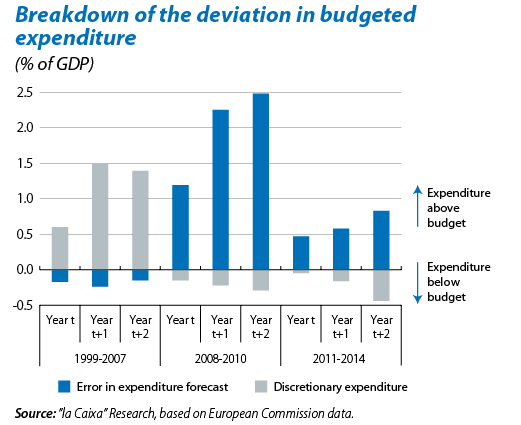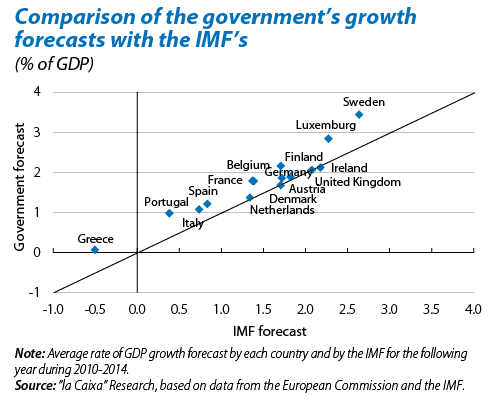
Member states often budget a larger fiscal adjustment than they end up carrying out in reality. As shown by an EC study,1 between 1999 and 2014 the budgetary adjustment approved was 0.4 pps more than the adjustment actually carried out one year later, on average. This difference increases to 0.8 pps for adjustments planned two years ahead. This gap is largely because actual expenditure ends up being larger than planned.
Such deviation in budgeted spending is due both to errors in expenditure forecasts and also to discretionary spending incurred during the budget period. A breakdown of the deviation in various countries shows that, before 2008, most of the increase in unbudgeted spending was due to discretionary measures. However, as from 2008, the reason for such deviations is greater spending than forecasted, in particular an increase in unbudgeted social expenditure.

This unplanned increase in expenditure is not entirely innocent: many countries repeatedly overestimate their growth estimate when drawing up budgets. Growth forecasts for the year following the year in which public budgets are presented to the EC are, on average, 0.3 pps higher than the growth forecasts provided by other organisations such as the IMF for the same period.
Thorough budget planning is therefore seen as essential in order to improve public finances. Independent fiscal institutions, established several years ago in some countries in Northern Europe but only recently set up in Spain can be of some assistance in this task. Among other issues, these institutions analyse the macroeconomic forecasts of public budgets, the fiscal policies adopted and the cost of implementing the measures included, and they also attempt to monitor compliance of budget stability on the part of public administrations. One important aspect of their work is to make public accounts more transparent, as well as to offer recommendations regarding any possible problems, although the public administrations are ultimately responsible for taking any measures to resolve such difficulties.
Consequently, at the end of the day the public authorities are responsible for ensuring budgets are met as far as possible, and strong political commitment is required to implement the necessary changes in order to restore the state of public finances. This is the huge task facing European countries after several years of crisis.
Recommended Content
Editors’ Picks
EUR/USD clings to daily gains above 1.0650

EUR/USD gained traction and turned positive on the day above 1.0650. The improvement seen in risk mood following the earlier flight to safety weighs on the US Dollar ahead of the weekend and helps the pair push higher.
GBP/USD recovers toward 1.2450 after UK Retail Sales data

GBP/USD reversed its direction and advanced to the 1.2450 area after touching a fresh multi-month low below 1.2400 in the Asian session. The positive shift seen in risk mood on easing fears over a deepening Iran-Israel conflict supports the pair.
Gold holds steady at around $2,380 following earlier spike

Gold stabilized near $2,380 after spiking above $2,400 with the immediate reaction to reports of Israel striking Iran. Meanwhile, the pullback seen in the US Treasury bond yields helps XAU/USD hold its ground.
Bitcoin Weekly Forecast: BTC post-halving rally could be partially priced in Premium

Bitcoin price shows no signs of directional bias while it holds above $60,000. The fourth BTC halving is partially priced in, according to Deutsche Bank’s research.
Week ahead – US GDP and BoJ decision on top of next week’s agenda

US GDP, core PCE and PMIs the next tests for the Dollar. Investors await BoJ for guidance about next rate hike. EU and UK PMIs, as well as Australian CPIs also on tap.